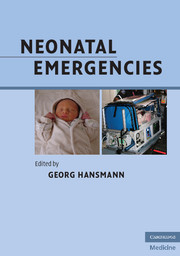Book contents
- Frontmatter
- Contents
- List of contributors
- Foreword (1)
- Foreword (2)
- Preface
- Acknowledgments
- Section 1 Organization of neonatal transport
- Section 2 Basics in cardiopulmonary resuscitation of newborn infants
- Basic equipment setup for initial neonatal care and resuscitation
- Drugs for neonatal emergencies
- Postnatal cardiopulmonary adaptation
- ABC Techniques and Procedures
- Sunctioning
- Stimulation, oxygen supplementation, bag-and-mask ventilation (M-PPV), pharyngeal/bi-nasal CPAP, and pharyngeal positive pressure ventilation
- Endotracheal intubation and gastric tube placement
- Laryngeal mask airway (LMA)
- Chest compressions
- Peripheral venous access
- Umbilical vein/artery catheterization (UVC, UAC)
- Central venous access (internal jugular vein)
- Intraosseous access
- Cord clamping
- Management of high-risk infants in the delivery room
- Monitoring in the delivery room and during neonatal transport
- Hygiene in the delivery room and during neonatal transport (infection control)
- When to call a pediatrician to the delivery room
- Checklist for the postnatal treatment of newborn infants
- Assigning individual duties in the delivery room
- Clinical assessment of the newborn infant
- Cardiopulmonary resuscitation of newborn infants at birth
- Volume therapy and sodium bicarbonate supplementation in preterm and term newborn infants
- Absolute and relative indications for neonatal transport and NICU admission
- Communication with mother and father
- Coordinating neonatal transport and patient sign-out to the NICU team
- Documentation and feedback after neonatal emergency transport
- Ethics in neonatal intensive care
- Perinatal images of preterm and term infants
- Mechanical ventilation of the neonate
- Questions for review (basics)
- References (Section 2)
- Section 3 Classic and rare scenarios in the neonatal period
- Section 4 Transport
- Section 5 Appendix
- Index
- Plate section
Ethics in neonatal intensive care
from Section 2 - Basics in cardiopulmonary resuscitation of newborn infants
Published online by Cambridge University Press: 05 March 2012
- Frontmatter
- Contents
- List of contributors
- Foreword (1)
- Foreword (2)
- Preface
- Acknowledgments
- Section 1 Organization of neonatal transport
- Section 2 Basics in cardiopulmonary resuscitation of newborn infants
- Basic equipment setup for initial neonatal care and resuscitation
- Drugs for neonatal emergencies
- Postnatal cardiopulmonary adaptation
- ABC Techniques and Procedures
- Sunctioning
- Stimulation, oxygen supplementation, bag-and-mask ventilation (M-PPV), pharyngeal/bi-nasal CPAP, and pharyngeal positive pressure ventilation
- Endotracheal intubation and gastric tube placement
- Laryngeal mask airway (LMA)
- Chest compressions
- Peripheral venous access
- Umbilical vein/artery catheterization (UVC, UAC)
- Central venous access (internal jugular vein)
- Intraosseous access
- Cord clamping
- Management of high-risk infants in the delivery room
- Monitoring in the delivery room and during neonatal transport
- Hygiene in the delivery room and during neonatal transport (infection control)
- When to call a pediatrician to the delivery room
- Checklist for the postnatal treatment of newborn infants
- Assigning individual duties in the delivery room
- Clinical assessment of the newborn infant
- Cardiopulmonary resuscitation of newborn infants at birth
- Volume therapy and sodium bicarbonate supplementation in preterm and term newborn infants
- Absolute and relative indications for neonatal transport and NICU admission
- Communication with mother and father
- Coordinating neonatal transport and patient sign-out to the NICU team
- Documentation and feedback after neonatal emergency transport
- Ethics in neonatal intensive care
- Perinatal images of preterm and term infants
- Mechanical ventilation of the neonate
- Questions for review (basics)
- References (Section 2)
- Section 3 Classic and rare scenarios in the neonatal period
- Section 4 Transport
- Section 5 Appendix
- Index
- Plate section
Summary
Neonatal resuscitation and intensive care may need certain restrictions and limits if it is to be in the best interests of the newborn infant. There are circumstances in which treatments that merely sustain “life” neither restore health nor confer other benefit and hence are no longer in the child's best interest. Imposing resuscitation or advanced critical care medicine on an infant requires a greater justification than mere survival. There must be a rationale on which doctors decide the infant may face not merely pain and suffering, but rather a realistic chance of long-term survival without devastating sequelae. Survivability is not the only issue at stake. Both suffering inflicted by medical procedures and severe long-term morbidity might be considered an even greater tragedy than death. This issue poses problems across multiple medical specialties, not just neonatology, and the ethical principles regarding resuscitation and advanced critical care of newborns are not different from those applicable to older children and adults. However, as the body of a newborn, particularly that of an extremely preterm infant, is still developing, both vulnerability and the potential for adaptive recovery exceed those of older children or adults.
Opinions and beliefs
The very nature of medicine implies inherent interference with the natural course of a disease. Doctors have powerful means, the use of which must be wisely considered. However, withholding or withdrawing medical care from patients with a poor prognosis raises challenging ethical, moral, legal, and emotional dilemmas.
- Type
- Chapter
- Information
- Neonatal Emergencies , pp. 184 - 190Publisher: Cambridge University PressPrint publication year: 2009



